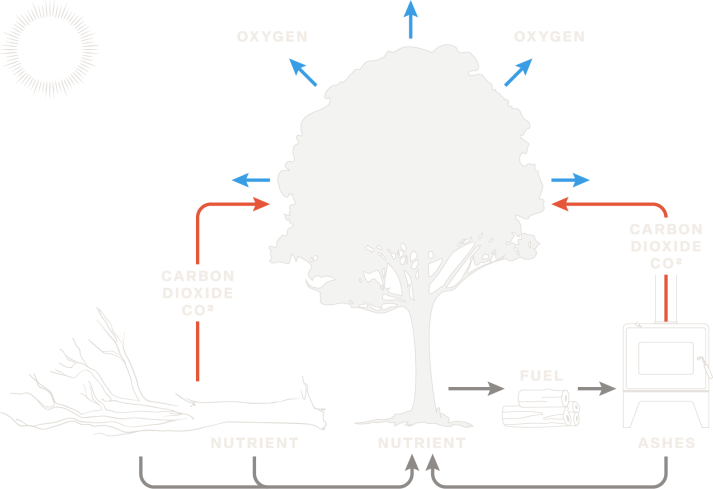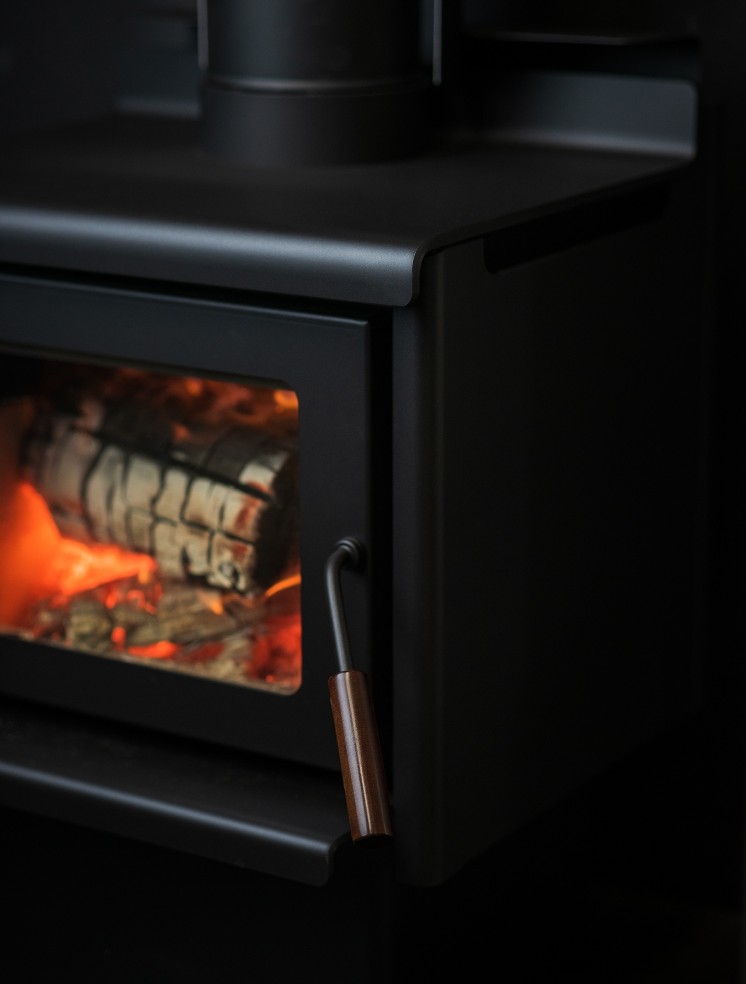- Built from sturdy materials for a long life
- Repair is straightforward, with replacement parts available to extend the burner’s life
- Majority of components are recyclable
- 100% New Zealand made construction reduces transport emissions



Sustainable
and carbon neutral.
A climate-positive choice.
Among the many changes New Zealanders can make to reduce household emissions, deciding on a heating source is a big one. The good news is that modern wood burners now top the list of climate-friendly heating options. Choosing an efficient wood burner means you can prioritise a low-impact lifestyle without compromising on the exceptional comfort and pleasure these burners deliver.

The facts about wood
Wood is a biofuel—plentiful and renewable
New Zealand is fortunate to have a productive forestry sector which is monitored by an international system called the Montréal Process. This keeps sustainability front and centre for our wood growers, ensuring wood regenerates quickly in well-managed forests. Also, compared to other fuels, wood can be harvested with minimal impact on the surrounding environment and fewer transport-related emissions.
Burning wood is carbon neutral
When sourced from a managed plantation, burning wood doesn’t add extra CO2 to the atmosphere. Here’s why.
A tree absorbs carbon as it grows. When it is felled and chopped into firewood, the carbon stays safe in your woodpile until it’s burned (which is when carbon is released back into the atmosphere). So long as the tree is replanted, the cycle of absorption and release can continue in a neutral manner.
A tree absorbs carbon as it grows. When it is felled and chopped into firewood, the carbon stays safe in your woodpile until it’s burned (which is when carbon is released back into the atmosphere). So long as the tree is replanted, the cycle of absorption and release can continue in a neutral manner.


Wood burners utilise a resource that might otherwise go to waste
New Zealand’s high-quality, sustainably-produced timber is in demand around the world. However, not all of it makes the grade. Using the lower quality wood for energy is a productive use of this natural resource. Firewood comes from all kinds of places too—not just planted blocks. Alternative sources include old shelter belts, wind-felled trees or simply overgrown trees that need clearing.
Good for the planet—and your power bill
By heating your home with wood, you are making a climate-positive choice that also cuts back on your energy costs. Adding a wetback system to certain models allows water to be preheated for the hot water cylinder, giving further savings.
Designed for longevity…
Considering the production and full life cycle of a product is important when evaluating its green credentials. The Woodsman design process has sustainable principles embedded from the beginning.
… and (ultra) low emissions
Innovation has always been a priority for our family company. Thanks to our non-negotiable standards for sustainable wood burner manufacturing, we’ve helped heating technology come a long way.
All Woodsman burners meet the requirements of the National Environmental Standards for Air Quality (NES for Air Quality) and the rigorous standards set by ECAN. We will continue to innovate and elevate our work, investing in our technology, our processes and our people to ensure the lowest possible emissions are produced today, tomorrow, and in all the tomorrows to come.

How to minimise your impact
To burn cleanly, fires need to be as hot as possible. Always ensure you choose the right wood burner, and that you operate it correctly.
- Choose ULEB-certified appliances that minimizes air pollution
- Look for wood with low moisture content that burns efficiently.
- Further tips for how to use a wood burner properly can be found here: warmercheaper.co.nz
The bigger picture
- Clean air monitoring data shows that PM10 and PM2.5 emissions have been steadily dropping for many years with most places in NZ meeting or exceeding the National Environmental Standards for Air Quality (NESAQ) and World Health Organisation guidelines. Areas that do not currently meet those standards are on track to do so.
- This has been possible through advancements made by Wood burning manufacturers and in particular the new Ultra Low Emission Burner (ULEB) standards created by Environment Canterbury.
- In 2021, ECan carried out real-life testing in Nelson and results indicate that ULEBs are operating in real life with emissions that are significantly lower than real-life emissions from traditional burners
- Make sure you are not burning toxic wood sources like treated timber
- Support reforestation efforts that maintain wood as a renewable resource



